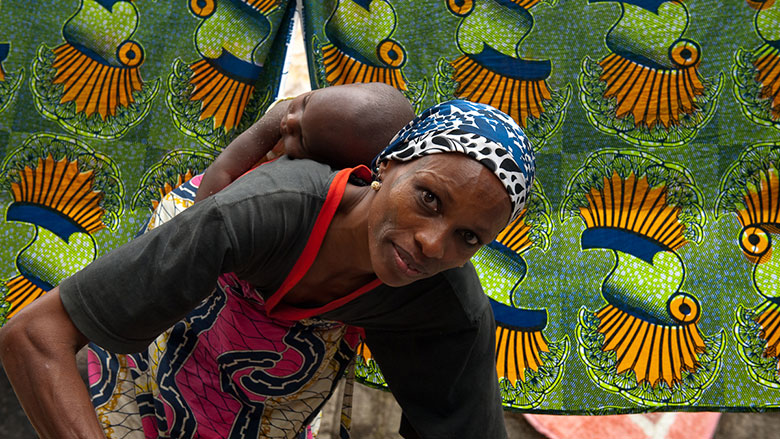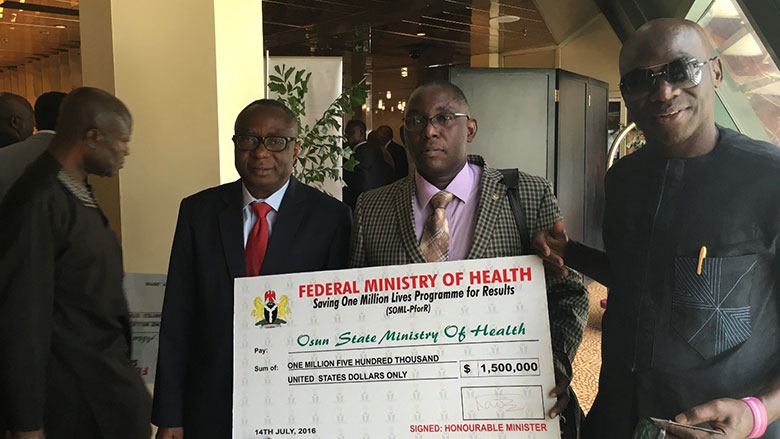The World Bank’s support for SOML will use the Program for Results (PforR) instrument to encourage greater focus on results, increase accountability, improve measurements, strengthen management, and foster innovation. PforR rewards states with untied fiscal transfers from the federal government when they achieve improvements in the coverage and quality of key maternal and child health (MCH) services as measured by independent household and health facility surveys. It will be implemented over four years.
“The ceremony signals the changing ethos within the health sector where the focus is gradually shifting from funding inputs such as drugs, commodities, hiring more health workers, and reimbursing activity costs only, to paying for results and improved health outcomes for beneficiaries,” said Benjamin Loevinsohn, World Bank Lead Health Specialist.
Despite huge investments in health, Nigeria’s health system underperforms relative to countries that spend less on health. Maternal and under-five mortality rates remain high, with about 900,000 women and children dying each year, largely from preventable causes. With a maternal mortality of 576 per 100,000 livebirths, and under five mortality of 128 per 1,000 live births, Nigeria accounts for 14% of global maternal mortality.
Though progress has been made in the last decade, the country did not achieve its Millennium Development Goal (MDG) targets on these indicators. It is in recognition of this that the PforR seeks to shift the focus to key MCH outcomes and increase access to high impact, cost effective, reproductive, maternal, child health, and nutrition interventions that save lives.
The SOML program involves:
- re-orienting the discussion of service delivery to results rather than just inputs;
- articulating strategic priorities for the Government of Nigeria and the rest of the health sector and strengthening the long term commitment to improving the delivery of these high impact interventions;
- establishing a limited set of clear and measurable indicators by which to track success;
- strengthening data collection so that these indicators can be measured more frequently and more robustly;
- bolstering accountability so that managers and health workers at all levels are engaged, encouraged, and incentivized to achieve better results; and
- fostering innovations that increase the focus on results and include greater openness to working with the private sector.
Building on experience from the World Bank-supported Nigerian States Health Investment Project, the PforR tracks performance on several maternal and child health indicators, rewarding states for improvements in skilled birth attendance, immunization coverage, insecticide treated net usage in children, vitamin A supplementation, prevention of mother-to-child transmission of HIV services, contraceptive prevalence and quality of care; while strengthening the governance and management of primary health care (PHC) systems to perform better.
To improve transparency in management and budgeting for primary healthcare, the PforR also rewards states and the federal government for publishing annual budget execution reports for PHC. This will make tracking government health expenditures at state and local government levels, currently an arduous task, easier.
An Innovation Fund, promoting innovation and private sector participation, will provide grants for the development and deployment of techniques, technologies, and large scale service delivery innovations targeted at improving maternal and child health.
“The PforR will help change the trajectory of preventable maternal and child deaths by increasing the coverage and utilization of life saving health interventions across PHCs in the country,” said Dr Ibrahim Kana, National Program Manager for SOML PforR. “It is a venture that comes with enormous rewards. Hopefully for the states, and ultimately for Nigerian mothers and children, this will be the first of many more performance checks to come.”


